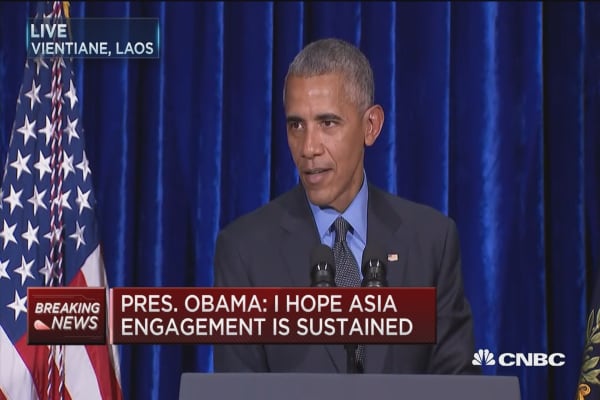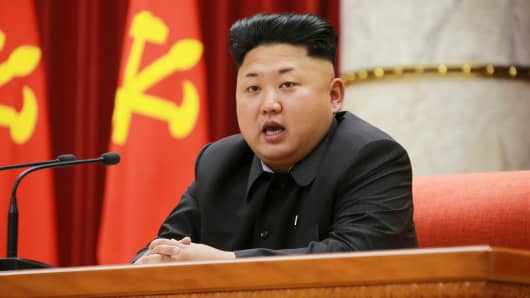North Korea said it tested a miniaturized nuclear
warhead on Friday, in response to the "threats and sanctions from
hostile elements," including the U.S., according to the isolated state's
official news agency.
North Korean state TV said that the test had no impact on the environment and caused no radiation leak, and proved that the country could make nuclear warheads whenever it wanted and mount them on ballistic rockets.
The statement from the rogue nation came after multiple global agencies detected seismic activity in North Korea on Friday morning local time.
The European Mediterranean Seismological Centre (EMSC) had logged a magnitude 5 earthquake in North Korea, at a depth of 10 kilometers, at 9 a.m. North Korean time. The quake was about 349 kilometers southeast of Jilin in China, the EMSC said.
The U.S. Geological Survey (USGS) also detected what it called an "explosion" that it said was 11 kilometers east-northeast of Sungjibaegam in North Korea, near a known nuclear test site.
"The wave form signal for an explosion and an earthquake have differences," Rafael Abreu, a geophysicist at the USGS, told CNBC. "Based on those differences, we are confident it was an explosion. But we can't say with any certainty what type of explosion."
He noted that the energy release was equivalent to a 5.3 magnitude earthquake.
In the hours following the seismic activity, Japanese and South Korean authorities said that they believed the explosion that caused the earthquake was the result of a nuclear test.
The South Korean military said the magnitude 5.0 seismic wave would indicate a 10 kilotonne blast, which would be the isolated nation's largest ever, local news agency Yonhap reported.
Meanwhile, South Korea's meteorological agency said that the "man-made" quake emitted energy double that emitted by a nuclear test North Korea undertook in January.
South Korea's Blue House, the equivalent of the U.S. White House, quoted President Park Geun-hyeas saying the North had conducted a nuclear test, adding that North Korea leader Kim Jong Un had behaved with "maniacal recklessness."
Park held an unscheduled phone call with Barack Obama to discuss the issue, as the U.S. president headed back to the United States from a regional summit in Laos. The Blue House said that the two leaders agreed to use every available means to pressure North Korea to abandon its nuclear program.
Meanwhile, Japan's Foreign Minister Fumio Kishida said his country had protested to North Korea over the suspected test, and Defense Minister Tomomi Inada told a press briefing that the country's test and advances in missile technology posed a grave threat to Japan.
"We can't deny the possibility that North Korea is miniaturizing a device to build a warhead," Inada said.
He added, however, that the magnitude of the quake suggested it was not a test of a hydrogen bomb, as North Korea had claimed to have tested in January.
Japan's chief government spokesperson said Japan would consider further unilateral sanctions against North Korea. Japan is a frequent target of North Korea's aggression, with at least two missiles test-launched in its direction in recent months.
The launch of a long-range rocket in February prompted even tighter United Nations sanctions against the country.
North Korea has conducted a series of missile tests in recent months, including a series of three missile tests on Monday as leaders of the Group of 20 nations held a summit in China.
North Korean leader Kim Jong Un has called recent U.S.-South Korean military drills in South Korea, as well as plans for the South to host a U.S. anti-missile system called THAAD, a provocation.
Analysts at the U.S.-Korea Institute at Johns Hopkins University reported on their website in late August that based on its current missile activity, North Korea was on track to develop the capability of hitting targets in the region, including Japan, by 2020.
http://www.cnbc.com/2016/09/08/north-korea-earthquake-detected-nuclear-test-a-possibility.html
North Korean state TV said that the test had no impact on the environment and caused no radiation leak, and proved that the country could make nuclear warheads whenever it wanted and mount them on ballistic rockets.
The statement from the rogue nation came after multiple global agencies detected seismic activity in North Korea on Friday morning local time.
The European Mediterranean Seismological Centre (EMSC) had logged a magnitude 5 earthquake in North Korea, at a depth of 10 kilometers, at 9 a.m. North Korean time. The quake was about 349 kilometers southeast of Jilin in China, the EMSC said.
The U.S. Geological Survey (USGS) also detected what it called an "explosion" that it said was 11 kilometers east-northeast of Sungjibaegam in North Korea, near a known nuclear test site.
"The wave form signal for an explosion and an earthquake have differences," Rafael Abreu, a geophysicist at the USGS, told CNBC. "Based on those differences, we are confident it was an explosion. But we can't say with any certainty what type of explosion."
He noted that the energy release was equivalent to a 5.3 magnitude earthquake.
In the hours following the seismic activity, Japanese and South Korean authorities said that they believed the explosion that caused the earthquake was the result of a nuclear test.
The South Korean military said the magnitude 5.0 seismic wave would indicate a 10 kilotonne blast, which would be the isolated nation's largest ever, local news agency Yonhap reported.
Meanwhile, South Korea's meteorological agency said that the "man-made" quake emitted energy double that emitted by a nuclear test North Korea undertook in January.
South Korea's Blue House, the equivalent of the U.S. White House, quoted President Park Geun-hyeas saying the North had conducted a nuclear test, adding that North Korea leader Kim Jong Un had behaved with "maniacal recklessness."
Park held an unscheduled phone call with Barack Obama to discuss the issue, as the U.S. president headed back to the United States from a regional summit in Laos. The Blue House said that the two leaders agreed to use every available means to pressure North Korea to abandon its nuclear program.
Meanwhile, Japan's Foreign Minister Fumio Kishida said his country had protested to North Korea over the suspected test, and Defense Minister Tomomi Inada told a press briefing that the country's test and advances in missile technology posed a grave threat to Japan.
"We can't deny the possibility that North Korea is miniaturizing a device to build a warhead," Inada said.
He added, however, that the magnitude of the quake suggested it was not a test of a hydrogen bomb, as North Korea had claimed to have tested in January.
Japan's chief government spokesperson said Japan would consider further unilateral sanctions against North Korea. Japan is a frequent target of North Korea's aggression, with at least two missiles test-launched in its direction in recent months.
China's official news agency Xinhua said that North
Korea's nuclear test was "not wise, but it added that South Korea's
decision to deploy a U.S. anti-missile system had damaged the region's
strategic balance.
On Thursday Yonhap reported that new satellite
imagery from U.S. monitoring group 38 North showed fresh activity at the
country's nuclear test city in Punggye-ri.
Additionally, South Korean state TV reported that China had begun monitoring for radiation in its northeast region, near the border with North Korea.
In January, North Korea launched its fourth-ever nuclear test, which initially set off warnings of a shallow earthquake. North Korea claimed at the time that the device was a hydrogen bomb, which it called the "H-bomb of justice," although experts said that there was no evidence that the explosion was a hydrogen bomb..
Additionally, South Korean state TV reported that China had begun monitoring for radiation in its northeast region, near the border with North Korea.
In January, North Korea launched its fourth-ever nuclear test, which initially set off warnings of a shallow earthquake. North Korea claimed at the time that the device was a hydrogen bomb, which it called the "H-bomb of justice," although experts said that there was no evidence that the explosion was a hydrogen bomb..
North Korea has conducted a series of missile tests in recent months, including a series of three missile tests on Monday as leaders of the Group of 20 nations held a summit in China.
North Korean leader Kim Jong Un has called recent U.S.-South Korean military drills in South Korea, as well as plans for the South to host a U.S. anti-missile system called THAAD, a provocation.
Analysts at the U.S.-Korea Institute at Johns Hopkins University reported on their website in late August that based on its current missile activity, North Korea was on track to develop the capability of hitting targets in the region, including Japan, by 2020.
http://www.cnbc.com/2016/09/08/north-korea-earthquake-detected-nuclear-test-a-possibility.html











No comments :
Post a Comment